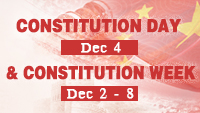Clean-up drive for disciplinary teams
Clear standards set for handling tips, working cases and managing assets
The country's 500,000-plus corruption investigators are being placed under stricter supervision after a regulation to standardize graft probes was adopted on Jan 8.
Experts says the regulation, passed at the annual plenary meeting of the top anti-corruption watchdog - the Central Commission for Discipline Inspection of the Communist Party of China - can help ensure an unsullied disciplinary team, after some corrupt investigators were exposed.
The regulation, details of which were not released, sets clear standards on how to handle corruption tips, how to check and review cases and how to manage ill-gotten money and assets, according to a report published on the commission's website on Jan 8.
It also encourages audio and video recordings throughout the entire process of the interrogation and the establishment of a registration system for those who make inquiries about, or try to interfere in, the cases, the report said.
"Trust (in disciplinary officials) cannot replace supervision," a meeting communique released on Jan 8 said. "We must make sure the power granted by the Party and the people is not abused."
Many commission members who attended the three-day meeting say they have felt rising pressure on disciplinary officials. In recent years, President Xi Jinping has repeatedly required officials to "clean house" to ensure a trustworthy disciplinary team.
"As those who enforce anti-graft rules, we must first place ourselves under scrutiny," says Liu Qifan, head of the anti-corruption watchdog in the Inner Mongolia autonomous region.
China launched a massive anti-corruption and austerity campaign as the top Party leadership was elected in late 2012.
Xi said on Jan 6 that years of effort have stopped corruption from spreading, and a "crushing momentum" against graft has taken shape.
However, some disciplinary officials have become conceited with the anti-corruption achievements, and a small number of them have loosened their self-restraint and become corrupt themselves, says Wang Yanfei, head of the provincial discipline watchdog in Sichuan province.
Since late 2012, more than 7,900 disciplinary officials from across the country have been punished for various types of wrongdoing, with 17 from the top anti-corruption watchdog being placed under investigation in graft probes, according to figures from the commission.
Recently, a three-episode TV documentary produced by the commission, named To Forge an Iron, One Must Be Strong Oneself, offered the public a rare glimpse into guilty officials from discipline inspection authorities.
It featured the cases of 10 former anti-graft officials, including Zhu Mingguo, who was once in charge of fighting corruption in Guangdong province.
In the documentary, Zhu, convicted in November of taking bribes of 141 million yuan ($20.4 million; 19 million euros, 16 million), admitted that he made use of his position. He said he received over a thousand bottles of expensive alcohol as gifts, and had taken bribes as far back as the 1990s.
"It is very rare for the commission to make such a documentary for publicity," says Xie Chuntao, director of the Dean's Office of the CPC Central Committee Party School, adding that the move also reflects the commission's determination to strengthen self-supervision.



